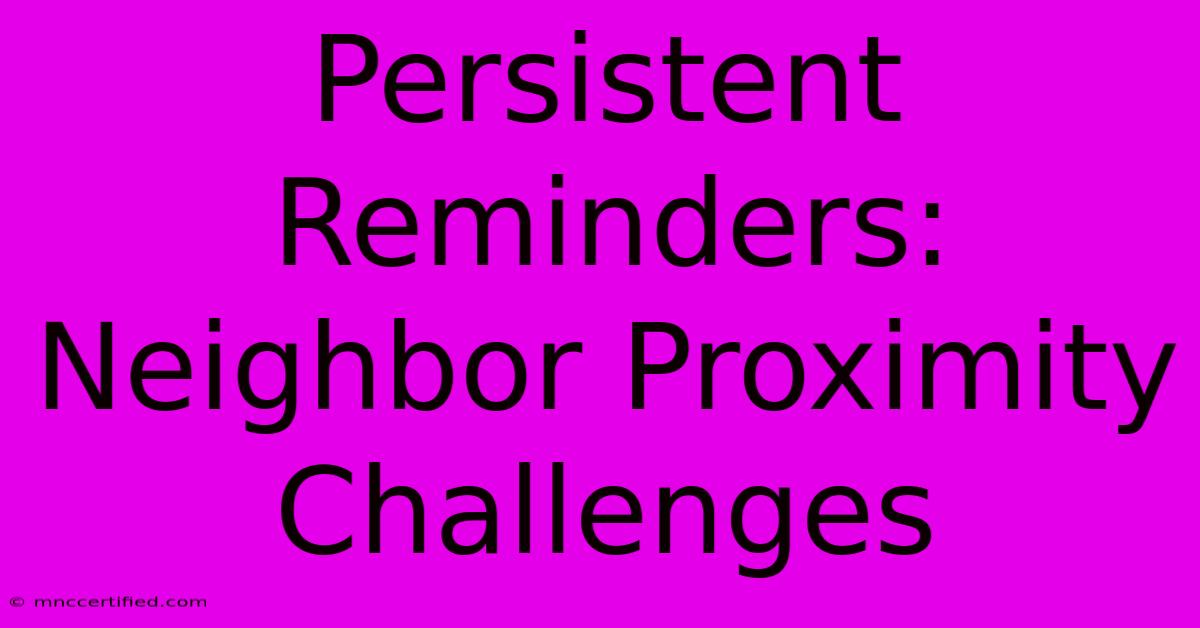Persistent Reminders: Neighbor Proximity Challenges

Table of Contents
Persistent Reminders: Neighbor Proximity Challenges
Living in close proximity to others brings a unique set of joys and frustrations. While community and camaraderie can flourish, so too can conflict and persistent reminders of shared spaces. This article explores the common challenges arising from close-knit neighborhoods and offers strategies for navigating these difficulties.
The Constant Presence: A Double-Edged Sword
Neighbor proximity, while offering a sense of belonging, often presents persistent reminders of shared living. The sounds of their lives – barking dogs, loud music, early morning lawnmowers – can intrude upon our own peace and quiet. These aren't necessarily acts of malice, but rather the everyday sounds of a community, amplified by close quarters. This constant presence can lead to:
Noise Pollution and Sleep Disruption
Perhaps the most frequent complaint among neighbors is noise. Whether it's construction, parties, or simply loud conversations, excessive noise can be incredibly disruptive, impacting sleep quality, productivity, and overall well-being. This is especially challenging for those with young children or sensitive sleep patterns. Keywords: noise pollution, sleep disruption, neighbor noise complaints.
Privacy Concerns
Shared walls, fences, and yards often blur the lines of privacy. The feeling of being constantly observed or overheard can be unsettling and lead to stress. Keywords: privacy concerns, neighbor privacy, boundary issues.
Parking Disputes
Limited parking spaces are a common source of friction in densely populated areas. Arguments over parking spots, blocked driveways, or inconsiderate parking can quickly escalate and sour neighborly relationships. Keywords: parking disputes, neighborhood parking, limited parking.
Property Maintenance and Aesthetics
Differing standards of property maintenance can create tension. An unkempt lawn, overflowing trash cans, or poorly maintained structures can negatively impact the overall aesthetic appeal of the neighborhood and cause frustration among neighbors. Keywords: property maintenance, neighborhood aesthetics, HOA disputes.
Navigating the Challenges: Strategies for Peaceful Coexistence
While complete avoidance of these challenges may be impossible, effective communication and proactive strategies can mitigate their impact:
Open and Respectful Communication
The first step in resolving neighborly disputes is open and respectful communication. Addressing concerns directly, but calmly and politely, is crucial. Try to focus on the specific issue rather than making personal attacks. Keywords: neighbor communication, conflict resolution, dispute resolution.
Establishing Clear Boundaries
Setting clear boundaries regarding noise levels, parking, and property maintenance can prevent misunderstandings and conflicts. This might involve having a friendly chat with your neighbors to establish mutually acceptable norms. Keywords: boundary setting, neighborly agreements, conflict prevention.
Mediation and Dispute Resolution
If direct communication fails to resolve the issue, consider seeking mediation from a neutral third party. Many communities offer mediation services to help neighbors find common ground. Keywords: mediation services, conflict mediation, neighbor mediation.
Utilizing HOA Resources (If Applicable)
If you live in a community with a homeowners association (HOA), utilize their resources to address violations of community rules and regulations. HOAs often have established procedures for handling neighbor disputes. Keywords: HOA dispute resolution, community rules, homeowners association.
Preventing Future Conflicts: Proactive Steps
Proactive measures can help prevent neighborly conflicts before they arise:
- Get to know your neighbors: Building positive relationships early on can foster understanding and cooperation.
- Be mindful of noise levels: Respect quiet hours and be considerate of your neighbors' schedules.
- Maintain your property: Keep your lawn mowed, trash cans emptied, and property well-maintained.
- Park responsibly: Avoid blocking driveways or parking in spaces designated for others.
By proactively addressing potential issues and employing effective communication strategies, you can significantly improve your chances of maintaining peaceful and harmonious relationships with your neighbors, even in close proximity. Remember that open communication and mutual respect are key to navigating the challenges of neighborly life.

Thank you for visiting our website wich cover about Persistent Reminders: Neighbor Proximity Challenges. We hope the information provided has been useful to you. Feel free to contact us if you have any questions or need further assistance. See you next time and dont miss to bookmark.
Featured Posts
-
Diageo Faces Wetherspoons Brewing Criticism
Dec 18, 2024
-
Honda And Nissan Explore Merger
Dec 18, 2024
-
Janis Timma Ex Wifes Tearful Statement
Dec 18, 2024
-
Mishal Husains Last Today Show
Dec 18, 2024
-
17 Hour Gale Warning Scotland
Dec 18, 2024